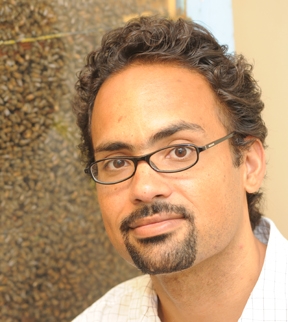Let it bee.
But the California State Beekeepers’ Association (CSBA) certainly won't.

Today they're enjoying tours and a president's reception. Then Tuesday through Thursday, it's all business. Or bees-ness.
UC Davis will be represented by three speakers: assistant professor Brian Johnson, Extension apiculturist Eric Mussen, and bee breeder-geneticist Susan Cobey.
Johnson who joined the UC Davis Department of Entomology last summer, will be introduced at the 9 a.m. session on Tuesday. He will speak at 11:15 a.m. on Wednesday: His topic “Plans for UC Davis Bee Research Program.” Johnson specializes in behavior, evolution, and genetics of honey bees, and apiculture. (See lab research)
A former UC President’s Postdoctoral Fellow in the Department of Environmental Science, Policy and Management (ESPM) at UC Berkeley, Johnson earlier served as a National Science Foundation Postdoctoral Fellow at UC San Diego and the University of Bristol, UK.
He holds a doctorate (2004) from Cornell University, Ithaca, N.Y. in behavioral biology (thesis: “Organization of Work in the Honey Bee”).
Extension apiculturist Eric Mussen, a member of the UC Davis Department of Entomology faculty since 1976, will speak on “The State of California Beekeeping” at 10:30 a.m. on Tuesday. He also will discuss on “Swarm Prevention” at 8:45 a.m. on Wednesday.The veteran bee guy serves as a liaison between the academic world of apiculture and the real world of beekeeping and crop pollination.
Bee breeder-geneticist Susan Cobey, who shares a dual appointment with the Harry H. Laidlaw Jr. Honey Bee Research Facility at UC Davis and Washington State University (WSU), will discuss “How to Raise Queens” at 8 a.m. on Wednesday.
Cobey’s research focuses on identifying, selecting and enhancing honey bee stocks that show increasing levels of resistance to pests and diseases. Cobey developed the New World Carniolan stock, a dark, winter hardy race of honey bees, in the early 1980s by back-crossing stocks collected from throughout the United States and Canada to create a more pure strain. Stock imported from the German Carnica Association has recently been added to enhance this breeding program.
Cobey and entomology professor Steve Sheppard of WSU are importing honey bee germplasm to increase genetic diversity in the U.S. honey bee gene pool. In addition, with stock imported from the Republic of Georgia, they hope to re-establish the subspecies Apis mellifera caucasica, another dark race of bee that is not currently recognizable in the U.S.
The CSBA is headed by president Frank Pendell, Stonyford; vice president Bryan Ashurst, Westmorland; secretary-treasurer Carlen Jupe, Salida; and past president Roger Everett of Porterville.
The CSBA purpose is to "educate the public about the beneficial aspects of honey bees, advance research beneficial to beekeeping practices, provide a forum for cooperation among beekeepers, and to support the economic and political viability of the beekeeping industry.”
And that it does. It will be a busy week.
Attached Images:

Newly emerged worker bee from the Harry H. Laidlaw Jr. Honey Bee Research Facility at UC Davis.

A newly emerged worker bee (front) and a drone (male). (Photo by Kathy Keatley Garvey)